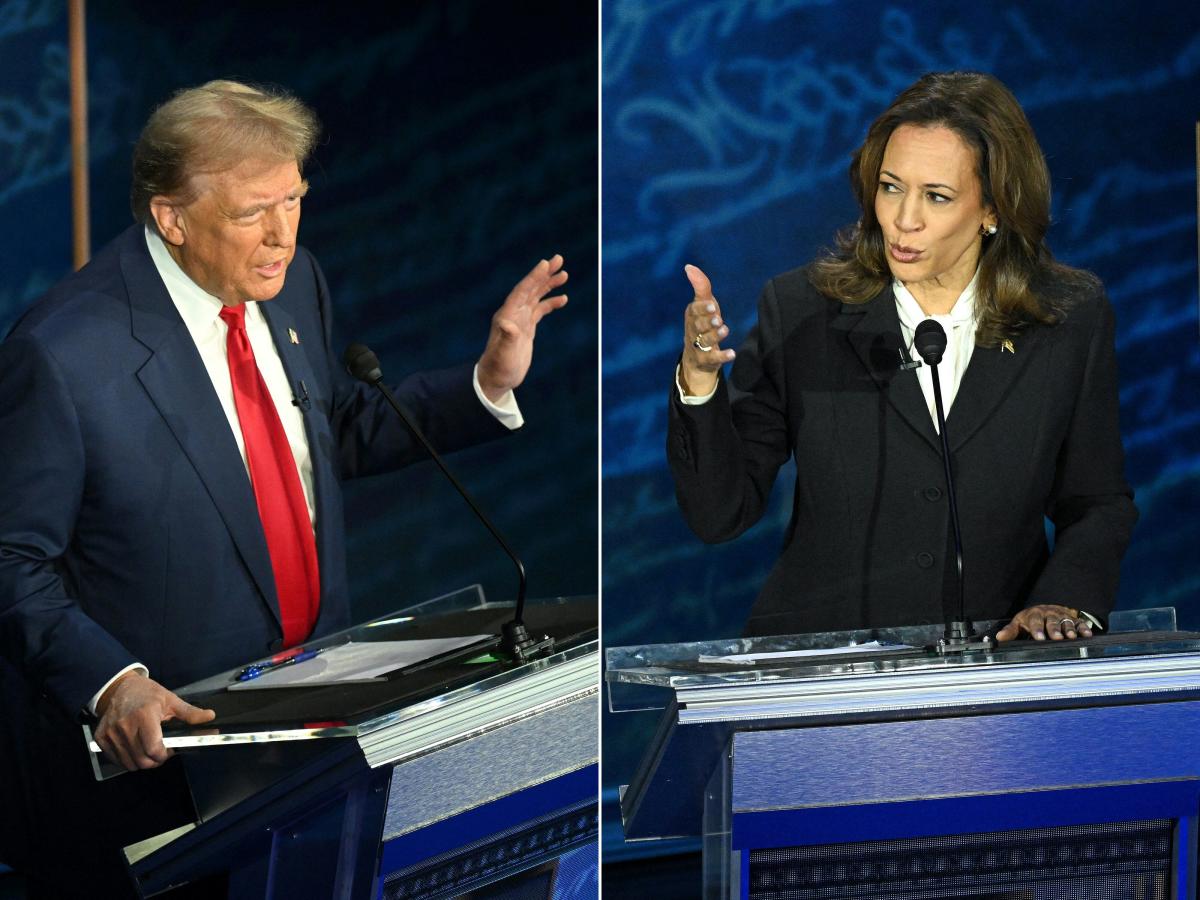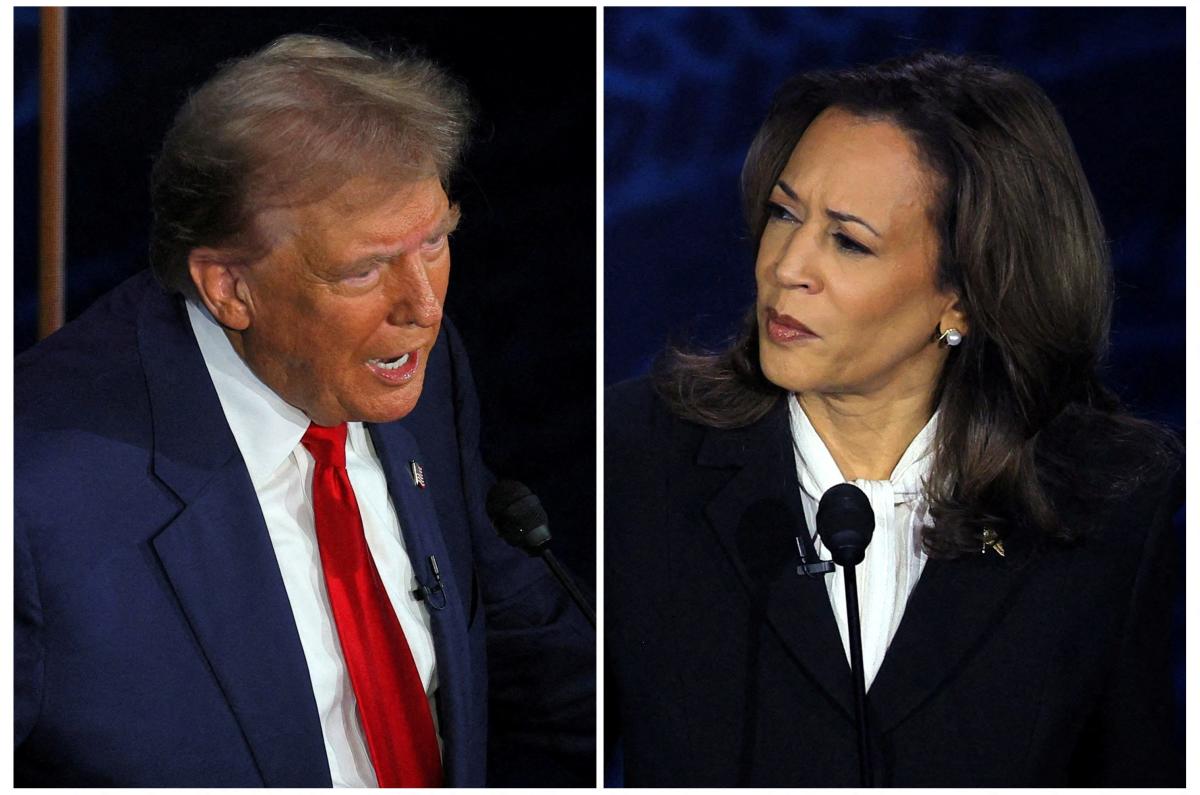Since July, the state of the 2024 United States presidential election has changed greatly. On July 13, there was an assassination attempt on presumptive Republican nominee and former President Donald Trump. Soon after on July 21, President Joe Biden dropped out of the race in favor of Vice President Kamala Harris.
With less than 80 days before Nov. 3, both parties have held their conventions and the race for the White House has begun in earnest.
The Republican ticket: former President Donald Trump and United States Senator JD Vance
On Saturday, July 13, two days before the opening of the Republican National Convention (RNC), Donald Trump survived an assassination attempt at a campaign rally near Butler, Pennsylvania. The event prompted calls for less polarizing rhetoric and condemnations of political violence from across the political spectrum.
From Monday, July 15 to Thursday, July 18, the RNC was held in Milwaukee’s Fiserv Forum, as Trump unveiled his running mate: United States Senator JD Vance of Ohio, known for his 2016 memoir “Hillbilly Elegy” and strong support of former President Trump after having previously been opposed to him. Among the notable speakers at the convention were former Republican presidential candidates Tim Scott, Nikki Haley and Ron DeSantis, as well as Republican nominees in competitive down-ballot races.
“America’s future will be bigger, better, bolder, brighter, happier, stronger, freer, greater and more united than ever before,” Trump remarked in his acceptance speech to convention attendees. “And quite simply put, we will very quickly make America great again.”
The Trump-Vance platform — known as Agenda 47, a reference to Trump’s intention to become the 47th President of the United States — offers voters a populist conservative agenda, with protectionist and nationalist elements.
– On immigration, Trump proposes enhancing border security and carrying out “the largest deportation operation in American history.”
– On the economy, he promises to “end inflation,” cut income taxes, not tax tips and “stop outsourcing, and turn the United States into a manufacturing superpower.” Furthermore, he has pledged to end electric vehicle mandates and pare back regulations on businesses.
– On crime, he offers a hardline approach to drug trafficking, gang violence and violent offenses to create “safe, clean, and beautiful” cities. Additionally, he has pledged to “end the weaponization of government against the American people.” This echoed conservative criticisms of investigations into those who stormed the Capitol building on Jan. 6, 2021. This promise also referred to Trump himself on charges related to attempts to overturn the result of the 2020 presidential election, withholding classified documents after leaving office and falsifying business documents.
– On democracy, Trump proposes several election security measures, including restricting early voting and the use of electronic ballot machines and requiring voter ID cards and proof of citizenship.
– On education, Trump has vowed to fight “critical race theory” and “radical gender ideology.” This refers to gender neutral bathrooms in schools and transgender individuals’ participation in girls’ and women’s sports. Trump has also advocated for “safe and patriotic” universities and the deportation of “pro-Hamas radicals.”
– Trump’s other policies include federalizing the administration of the District of Columbia and constructing a missile defense system for the United States like Israel’s Iron Dome.
The Trump-Vance ticket has faced much controversy over the course of the campaign. Much of it is centered on Project 2025: a policy package developed by the Heritage Foundation, a conservative think tank, with input from former Trump administration officials. Among its key proposals are expanding presidential power, replacing career civil servants with political appointees and abolishing the Department of Education. Trump has distanced himself from Project 2025, remarking on Truth Social that “some of the things they’re saying are absolutely ridiculous and abysmal.”
Trump has also come under fire for comments made at a panel at the National Association of Black Journalists’ 2024 convention in Chicago. He had responded to a question about Republicans referring to Harris as a “DEI hire” by falsely claiming that she had previously been “only promoting [her] Indian heritage” and “happened to turn Black” during her political career.
The Democratic ticket: Vice President Kamala Harris and Governor Tim Walz
After a disappointing performance in a June 27 debate against Trump, President Biden faced mounting pressure from the Democratic Party to drop out of the presidential race. This ultimately culminated in his July 21 decision to suspend his re-election campaign and endorse Vice President Kamala Harris as the presumptive Democratic nominee. Her campaign has been well received by Democrats and appears to have made a race that was previously tilted in Trump’s favor more competitive.
At a Philadelphia rally on Aug. 6, Harris announced that she would be running alongside Minnesota Governor Tim Walz, a pick favored by progressive Democrats. Previously unknown outside of Minnesota, Walz’s profile rose after calling Republicans “weird” in an interview with MSNBC, a strategy that won over younger Democrats and that Harris herself leaned into before officially naming Walz as her running mate.
Monday, Aug. 19 to Thursday, Aug. 22, the 2024 Democratic National Convention (DNC) was held in Chicago’s United Center, as Harris and Walz sought to maintain their momentum and unify their party. Notable speakers included President Joe Biden, former President and First Lady Barack and Michelle Obama and 2016 Democratic presidential nominee Hillary Clinton, as well as progressives like Minnesota Attorney General Keith Ellison and Congresswoman Alexandria Ocasio-Cortez.
“It is now our turn to do what generations before us have done, guided by optimism and faith, to fight for this country we love, to fight for the ideals we cherish and to uphold the awesome responsibility that comes with the greatest privilege on Earth: the privilege and pride of being an American,” Harris said in her acceptance speech. “So let’s get out there, let’s fight for it. Let’s get out there, let’s vote for it, and together, let us write the next great chapter in the most extraordinary story ever told.”
Despite the enthusiasm surrounding the Harris campaign, Republicans have accused her of lacking substance. Trump’s campaign created a website purporting to list Harris’ policies and asserting that Harris “own[s] the weakness, failure, and chaos of the Harris-Biden Administration.”
In response, Harris has fleshed out parts of her platform while on the campaign trail. Harris revealed a “populist policy agenda” centered on building an “opportunity economy” and strengthening the middle class at a Raleigh, North Carolina rally on Aug. 22.
In her address, Harris called for several changes, including:
– Eliminating medical debt
– Banning price gouging on groceries
– implementing prescription drug price caps
– offering first-time home buyers a $25,000 subsidy over a four-year period
– offering new parents a $6,000 child tax credit for the first year of their child’s life.
On other policy matters, she has made statements about the importance of abortion access, LGBTQ+ rights and the right to vote, claiming that Trump “wants to take the country backward” in these regards.
The Harris-Walz campaign has its critics from both the right and left. Conservatives have labeled Harris the “border czar,” seeking to tie her to what they view as “the worst border crisis in U.S. history.” Some have scrutinized Walz’s military record with the Minnesota Army National Guard with claims that he misrepresented the exact nature of his service, especially with regard to whether he served in combat.
Pro-Palestine activists in support of an immediate ceasefire in the Israel-Hamas war have decried President Biden’s support for Israel. A campaign during the Feb. 27 Michigan Democratic primary ended with 13% voting “uncommitted.”
During the Harris campaign, activists have disrupted rallies and planned to protest in Chicago during the DNC. However, many of their demands — including calls for a Palestinian convention speaker — have gone unaddressed, with many progressives appearing content with Harris’ support for an end to the conflict.
Polling and predictions
At the time of Biden’s withdrawal from the race, the Cook Political Report’s polling average showed a nearly three-point lead in Trump’s favor (47.4% vs. 44.7%). However, as of Aug. 30, its polling average now shows Harris leading Trump, albeit with a narrower 1.2-point lead (47.6% vs. 46.4%).
In an Aug. 18 ABC News/Ipsos poll, 89% of respondents said that the economy would be an important factor in their vote, with 86% saying the same of inflation, 77% saying as much about both health care and democracy, 76% considering crime and safety and 70% considering immigration.
More respondents trusted Trump over Harris with the economy, inflation, crime and safety and immigration. The Republican party was favored by nine, nine, three and 10 points, respectively.
Harris was trusted more than Trump on health care and protecting democracy, with the Democrat favored by six and three points, respectively.
As of Aug. 19, the Cook Political Report has named six tossup states that altogether account for 77 Electoral College votes: Arizona (11), Georgia (16), Michigan (15), Nevada (6), Pennsylvania (19) and Wisconsin (10). Voters of each of these states, except for Georgia, will also be voting in competitive Senate races considered crucial to determining control of the chamber in the 119th United States Congress.














